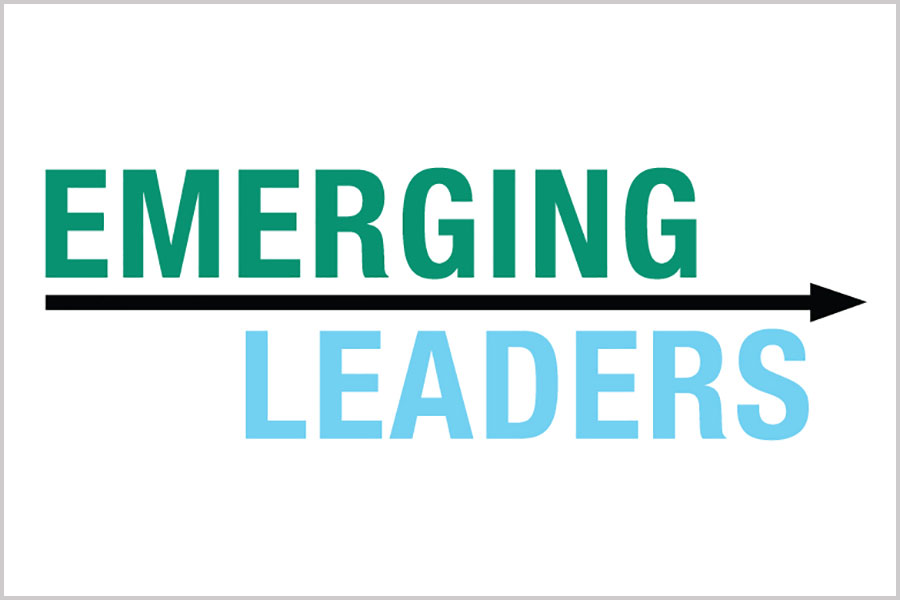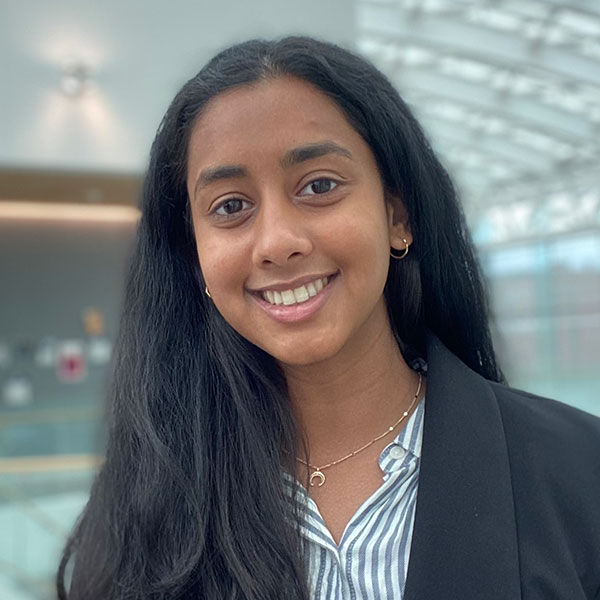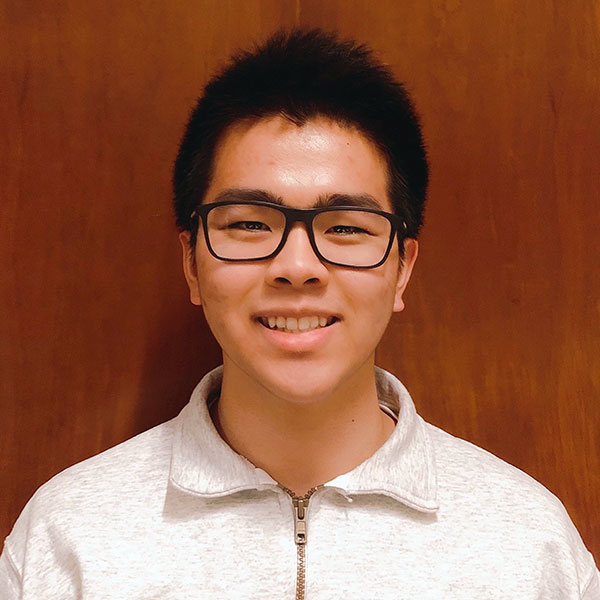
Emerging Leaders Program Wraps Up With Virtual ELebration Event
In April, the Emerging Leaders seven-week program culminated in the ELebration event. This year, the program, as well as the wrap-up event, looked different than it had in the past, due to the pandemic. Organizers of the program did not let that deter them from providing this long-standing CMU tradition to first-year students. They worked to envision the program and final event as a fully virtual experience, and they succeeded in providing undergraduate students with a truly life-changing and inspiring experience.
Forming Leadership Foundations
The Emerging Leaders (EL) program promotes the development of leadership skills through the lens of civic engagement and social action. The goal is to help form leadership foundations in those who go on to helm the university's student government, student organizations, academic programs, athletic teams, and research initiatives. This year, seven Tepper School undergraduate students were confirmed to participate in the program: Alice Nie, Brianna Baker, Coleman Isner, Lauren Woody, Nathan Pan, Roshni Surpur, and Sam Straus.
The program, which kicked off in February, grouped participants together and challenged them to define how they could inspire their peers to social action in order to make a positive impact on the community. Each group, led by an upper-class mentor, had the next seven weeks to choose their social issue and address how they could create a movement to help solve it.
Mentors Reflect on EL Experience
This year, two of the upper-class mentors were Tepper School students. Jen Jia and Olivia Zhang, who participated in the program during their first year, returned to support two of the student groups. Reflecting on the experience, Jia and Zhang both felt that this was a learning opportunity for them as much as it was for the students. “I gained so much from my role as a mentor," said Jia. "I learned about how to effectively facilitate virtual group meetings, motivate my team to cross the finish line, and create a collaborative environment that welcomed all ideas. But more importantly, I learned the most from my team. I was always inspired by my team members and how hardworking, passionate, and driven they all were.”
Likewise, Zhang said of her experience as a mentor, “I learned plenty of things about effective communication and how to generate discussion. There was obviously a lot of initial awkwardness due to Zoom and the lack of personal interaction. It was important that I took the initiative to break the ice and create a welcoming and natural environment."
I also had to get very comfortable with extended periods of silence," explained Zhang. "People need to time generate their ideas and sometimes gather the courage or willingness to share their thoughts. It was a lot more effective for me to wait and let my students speak up so that they felt like they were part of the program, and they got practice leading discussions and supporting their ideas. With that, I learned when it was appropriate to wait for someone to share their thoughts or choose to move on and come back to the question or topic later. Reading the room is a skill that I definitely got a lot better at.”
Both mentors were committed to their groups and supported their progress through all seven-weeks, ending in helping them to prepare for the ELebration. They worked with their groups to overcome everything from scheduling challenges to helping them with their presentations to the judges. The participating students found the mentorship experience to be invaluable and a key to their success when presenting to the judges during ELebration.
“One of my favorite parts about ELebration was seeing everyone’s work throughout the program," Jia said. "Every team had incredible ideas, spanning topics like food insecurity, mental health education, and medical racism. I was proud of not only my team but also proud and inspired by every team that day.”
At the Elebration event, students presented to a panel of judges, which included Swartz Center Entrepreneurial Fellow, Robert Miller. Miller said his experience “Judging this event was incredible for a couple of reasons. One, it was amazing coming from the graduate level and seeing the innovation of undergrads. It reminds me that there is incredible innovation happening outside of graduate colleges at CMU. Second, the energy judging this event was tremendous. Between the energy my co-judges brought to the table and the excitement all of the undergrads had, we were locked in from start to finish.”
The student groups pitched their five-minute plan and project and were then scored on their adherence to the prompt as well as the quality of their presentation. There were ten teams who presented to the judges, with two ultimately taking home the grand prizes. The winning team members were given $75 gift cards to the University Store and also the option to have further assistance implementing their plan for social change
Deciding on the winners was no easy task. “This was very tough! All of the participants had incredible ideas, but ultimately, we landed on two first-place winners," said Miller. "We were able to move forward with them because of the work they put in preparing for this competition, from having viable business plans to having worked with professionals in their space of interest leading up to the event."
Zhang was equally impressed with the quality of the programming this year in spite of the need to move it virtually. “This year EL definitely changed a lot in response to COVID. We had to do our entire retreat online, and students did not get the opportunity to bond with one another through physical group activities like they usually would." Zhang continued, "That being said, the response, attendance, and dedication from the participants was astronomical. I cannot thank the participants enough for sticking with the program to the very end.”
Miller added, “The breadth of ideas coming in from this year’s participants was amazing. But most of all, the attention to detail that these groups had was impressive. They have done a ton of early work to create genuine businesses that can help multitudes of people. It is impressive to see this coming out of such young participants.”
Student Takeaways From Emerging Leaders Program
We caught up with two Tepper School undergraduate business students, Roshni Surpur and Nathan Pan, for their perspective on the program and ELebration event this year. Surpur’s group focused on an on-campus issue related to composting and recycling. Pan’s group, which was selected as one of this year’s winners, chose to address food insecurity.
Could you describe your experience participating in this program?
Surpur: I loved my Emerging Leaders experience! The program started with a kickoff where we heard from amazing speakers, talked about different leadership strategies, and bonded with other EL students. Then, over the course of the next few weeks, my small group and I worked on creating a pitch to suggest ways to improve sustainability on campus. We brainstormed practical ways to enhance compositing with standardized bins, spoke with different CMU organizations that were spearheading other sustainability initiatives, and began a petition intended for the higher administration to reconsider current unsustainable practices. I’ve always been interested in doing social justice work in environmentalism but could never find an appropriate outlet. EL gave me and my groupmates a platform to speak about something we were passionate about.
Pan: I had a fun time getting to know the members of my group and working with them on the project. I also enjoyed learning about my leadership style and hearing from the speaker, Sidney Kushner, about his project with Connecting Champions.
How did your classes at the Tepper School help you with your group project?
Surpur: There are two main parts of being a Tepper School student that I found helpful in Emerging Leaders: my Business Leadership Endeavors class and the extensive collaboration in all of my classes. Business Leadership Endeavors is a three-year mini-sequence program where Tepper School students can discuss how to be a better leader, communicator, and team player, all while having a growth mindset. Emerging Leaders was like an extension of the class and gave me another opportunity to evaluate my strengths as a leader and where I can improve. Second, I found that with being a Tepper School student, there is not a day that goes by without collaborating with others. Homework assignments, classes, Tepper clubs, and extracurricular activities, all require talking and working with others daily. This constant collaboration has helped improve my communication and listening skills.
Pan: The classes taught me how to work well in a group and to know when to step up or step back during a group project.
What did you enjoy most or least?
Surpur: I had an absolutely amazing group! We bonded through our weekly meetings, which can be hard to do over Zoom, but when you have a fun and energetic group as I did, it makes the experience all the more worthwhile. My group was diverse both in background and major/discipline so that made our discussions much better, and I enjoyed hearing perspectives that were very different than mine.
Pan: I enjoyed working with other students from a wide range of schools in CMU the most. It was a little hard to meet people in the program outside of my project group because of the virtual environment.
How did you prepare for the ELebration event and your presentation in front of the judges?
Surpur: The Tepper School organized many of the experiences that helped me feel prepared for the ELebration. Through the Tepper School, I was able to compete in many school-wide and club-wide business competitions to work on my presentation, organization, and public speaking skills. I used the feedback I received in those competitions to enhance my parts and my peers’ parts in our pitch.
Pan: My group and I practiced presenting in front of our mentor, and we gave each other feedback on how to improve our parts.
How did you balance participating in the program with your coursework?
Surpur: It wasn’t difficult to find a balance between the program and my coursework because participating in EL gave me skills to be more efficient in my coursework, specifically when communicating with my teachers during class or my peers in group projects or study sessions.
Pan: I met with my group weekly at the same time so I was able to plan out my coursework around it accordingly.
What made you interested in the Emerging Leaders program?
Surpur: I wanted to learn how to be a better leader and work on creating social justice with a group of committed and like-minded people. Social justice is a group effort and requires different outlooks and different experiences in order to approach solving a social issue in the most effective way possible. Emerging leaders is the perfect catalyst for social justice because the program brings together people who are willing to create change and learn from each other to do so.
Pan: I wanted to be able to meet other students in my class year as well as develop my leadership skills at the same time.
Looking back on the program, what did you take away?
Surpur: On an intrapersonal level, I used my EL experience to reflect on my strengths, weaknesses, and ways to become a better ally. As a woman of color in heavily male-dominated fields, I wanted to learn how I can use those strengths to uplift marginalized voices. I was very fortunate to be a part of a diverse group of people, so I could hear about experiences based on identifiers that I don’t share, and this ultimately helped me to understand how I can better use my privileges and be a better ally.
Pan: I was able to improve my leadership skills and learn more about myself as a whole. I was also able to learn more and tackle an important issue that plagues our community.
What would your advice be for future Emerging Leader participants or incoming first-year students?
Surpur: Get to know your group members and other students in Emerging Leaders on a personal level. Everyone volunteered to be in EL so that means everyone came into the program with a growth mindset of wanting to learn how to become better leaders. If someone makes a good point in a discussion, Zoom private message them about how much you appreciated their comment! If there is a speaker that resonates with what you want to do in life, reach out to them over email! If there is someone you enjoy talking to during meetings, ask them for lunch after! I did all three of those things and have made meaningful connections because of it. The people in Emerging Leaders will be some of the coolest people you’ll meet!
Pan: My general advice is that sometimes you need to step outside of your comfort zone to help you achieve bigger and better things.
Anything else you’d like to share?
Pan: I think the program was a very insightful and fun experience, you get to meet other first-year and learn more about yourself. I definitely recommend it to incoming first-year students, and next year, it’ll be even better when the program is hopefully in person. My group is trying to implement the idea that we developed for the ELebration event. We wanted to have a more streamlined process of donating unused Blocks/Flex dollars by having a place in SIO where this could be done when the semester is over. We’ve met with some higher-ups already to talk about our idea, and we plan to keep advocating for this idea next year as well.


